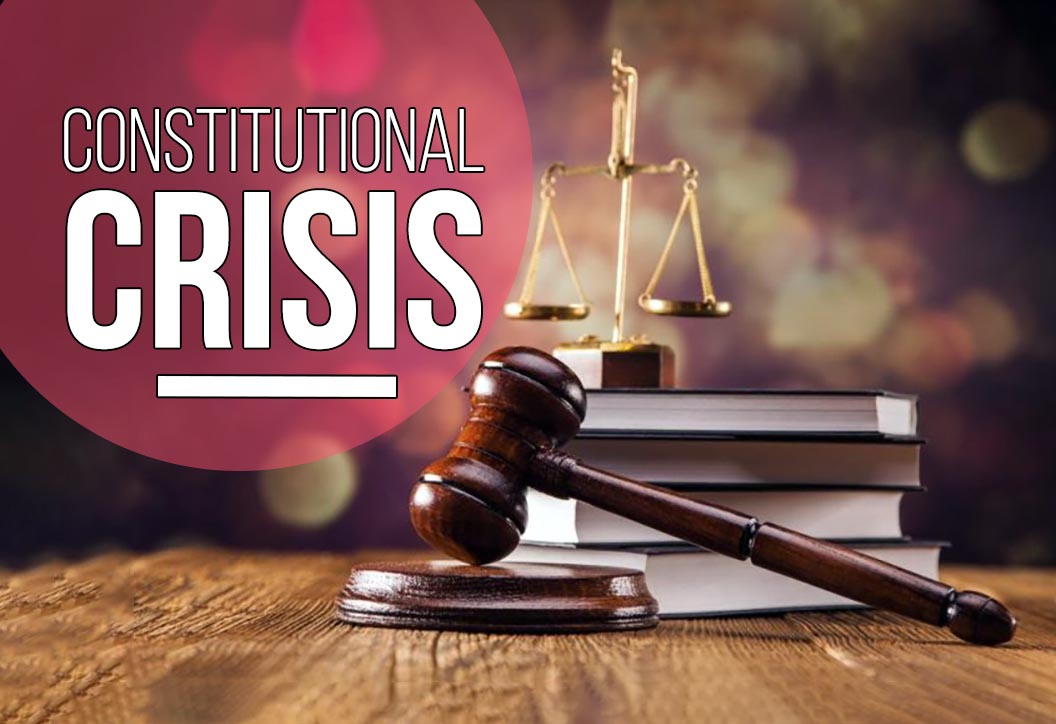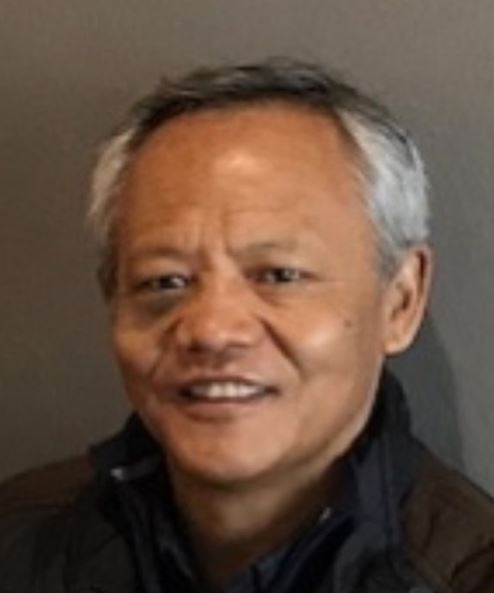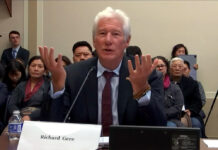Kunsang Tanzin* contends that a constitutional crisis has arisen from the refusal of the Standing Committee of the Tibetan Parliament in Exile to submit to the jurisdiction of the Tibetan judiciary on the latter’s apex body’s recent decision to rule its postponement of the Sep 2020 session of the parliament beyond the period permitted by the Charter of Tibetans in Exile unconstitutional and points out that the Charter leaves no room for the possibility of this crisis from arising.
(TibetanReview.net, Oct04’20)
Whenever the three branches of a democratic government are engaged in an obstinate deadlock and are not functioning smoothly by submitting to the supremacy of the highest law, the Charter in our case, one can safely conclude that the constitution, under such circumstances, is not functioning as intended. Such a circumstance can lead to what is known as “constitutional crisis”. Evidently there is a constitutional crisis currently prevailing in Gangchen Kyishong. This unnecessary crisis is being perpetuated by the obstinate reaction of the Speaker and the Standing Committee members to the suo motu action initiated by the Supreme Justice Commission. The development such as this is not only not a good sign, it has become a matter of huge embarrassment as well as a great concern for all of us. Such a crisis, if not recognized and not remedied in a timely manner, can endanger our democracy immeasurably. The damage to our democracy is already done. And if such damage is not repaired, that too effectively, in time, it may start leading to an eventual slow demise of our democracy.
The Charter, our constitution, is the bedrock on which the edifice of the Tibetan Administration in exile stands. It is also the essential pillar around which revolves the unity and hope of us Tibetans in exile. Therefore the role of the Supreme Justice Commission as the custodian of the Charter is unquestionably vital; it is there to ensure that no individual or authority misuses their electoral standing to violate any of the provisions of the Charter in an autocratic way. It is this crucial understanding of the role of the Supreme Justice Commission which is being put to test. The Speaker and other members of the Standing Committee have unfairly crossed all the conventional limits of their function as responsible members of Tibetan parliament. They appear to have conspired to denigrate the status of the Supreme Justice Commission by threatening it with consequences and accusing it of having ulterior motives (Daga Nyendhuk). For the Tibetan Parliament to call out the respective individual names of the Supreme Justice Commission in a belligerent tone show their complete lack of civility.
I rest my criticism of the actions of the Speaker and members of the Standing Committee on the following grounds.
1. The Standing Committee’s decision was illegal
There is no provision any where in the entire Charter that gives authority to the Standing Committee of TPiE to meet and decide on a subject known as “postponement” of the assembly session of TPiE. Doing that tantamounts to disrespecting the Charter and is unconstitutional. Unfortunately this is what happened on 13th August 2020 in a meeting of the Standing Committee. The TPiE issued a press statement on August 17, 2020 stating, “The 10th Session of the 16th TPiE scheduled to be held for 8 days from 16-24 September 2020, will be postponed until March 2021, as per the decision taken at the 327th Standing Committee meeting on 13th August 2020, in accordance to the Article 6 and clause 2 of Article 49 of the Charter of Tibetans in exile’.
This is a violation of the Charter committed by meeting of the 327th Standing Committee.
2. No provision in the Charter to postpone a session
Our Charter makes provisions only for adjournment of a session already in sitting for the purpose of achieving the minimum quorum. Technically and legally speaking any delay of a session not in sitting is simply not possible under the Charter. To do so by any official or by a Committee is crossing the boundaries set by the Charter, and, thus unconstitutional. However, this is what happened in the above mentioned meeting of the Standing Committee.
3. Under Article 49 the Speaker enjoys no power to postpone a session
The TPiE statement claims that the Speaker has the power to postpone a session. This claim has no basis and is inaccurate. Article 49 (2) states, “If a session of the Tibetan Assembly is required to be adjourned by more than a week in the absence of the minimum quorum required, the Speaker of the Tibetan Assembly may adjourn the meeting”. It should be clear to anyone who has some rudimentary knowledge of the constitution that the intent and purpose of Article 49 is to specify that a session may ONLY be adjourned to achieve minimum quorum at a later date. Therefore, the intent and purpose of clause 2 of Article 49 is NOT to give power to the Speaker to postpone a session, which is not in sitting. To claim anything other than its intended purpose is unfounded and misleading.
4. Under the Charter there is no requirement of minimum quorum to call a session
The Speaker and the members of the Standing Committee claim that they decided to postpone the 10th Session because they could foresee improbability of achieving the minimum quorum due to the prevailing COVID 19 restrictions. Since the Charter is silent of the requirement of minimum quorum, a session may have been convened with as little as ten to eleven members in attendance. It is a common scene to observe parliamentary sessions all over the world with almost empty halls, with the Chair and a few members there. Apparently there were no signs of any major hurdles to convene eleven members of the 327th Standing Committee meeting on 13th August 2020. If that was the case and had the Speaker applied his mind, it would have been easier and more practical to call the 10th session with these same members in attendance along with possibly a few other members living in and around Dharamsala. After completing the initial formalities, such a session could have been adjourned sine die by the Speaker within the first few hours and thus meet the requirement under the Charter to convene the next session within six months. Yet instead of trying to find a simple viable solution, they chose to undermine our Charter by treading on a path to denigrate an important institution, which in other democracies is respected as the Custodian of Constitution and Guarantor of Fundamental Rights.
5. As custodian of the Charter the Supreme Justice Commission can initiate suo motu action
The Speaker and other members, particularly an Amdo member, made erroneous claims about Article 68 and Article 5. They claimed that the Supreme Justice Commission neither has the power to take suo motu steps nor has any jurisdiction to invalidate the decision of the Standing Committee meeting to postpone the 10th session. Firstly, Article 68 was amended to be removed from the Charter after His Holiness handed over the complete political authority to an elected leadership. To make any reference to it now is completely redundant.
Secondly, the Speaker and several members of the Standing Committee have been members of our Parliament for many years. With so many collective years of experience it is expected of them to know and understand the meaning of various provisions of the Charter. Unfortunately, such an expectation appears to be unrealistic. Clause 1 of Article 5 states that the Supreme Justice Commission enjoys the power to declare null and void any law or regulation that it deemed repugnant or unacceptable according to any provision of the Charter. This is what the Supreme Justice Commission did this time as the custodian of the constitution (charter) through its power to exercise judicial review and by interpreting (clause 2A of Article 66) the provision of the Charter.
It is also important to note that Article 5 does not specify any precondition; for example, an existent complainant, for the Supreme Justice Commission to take action under Article 5. The Supreme Justice Commission has the power to initiate suo motu actions. Suo motu actions from the judiciary are a regular practice. For example, The Lucknow bench of Allahabad High Court on Thursday (October 1) took suo motu cognizance of the Hathras incident, and issued summons to top state government officials including ACS Home, DGP, ADG Law & Order besides Hathras DM and SP by 12th October. There is no way that these officials can refuse to comply with the order of the Court on the ground that there were no complainants. Therefore, it should not be a matter of any surprise to anyone when the Tibetan Supreme Justice Commission initiates suo motu actions when it deems necessary. Moreover, it is relevant to note that the suo motu action of the Supreme Justice Commission which barred a Kalon nominee in 2019 from taking official oath was not questioned.
6. How dispute arises under clause 2 of Article 5?
Naturally there is no dispute arising out of a declaration by the Supreme Justice Commission under Article 5 unless and until someone comes forward to challenge it. Only when someone challenges such a declaration, clause 2 of Article 5 comes into play. Till such a situation arises any order of the Supreme Justice Commission that declares any law or regulation null and void is valid. The Speaker or the members of the Standing Committee can go out and challenge a declaration. If challenged, a dispute will arise in accordance to clause of 2 of Article 5. However, the power to adjudicate such a dispute lies exclusively with the Supreme Justice Commission and the members of the Standing Committee cannot in turn dispute the power of the Supreme Justice Commission to adjudicate the risen dispute.
7. No one except the Supreme Justice Commission has the power to interpret the provision of the Charter
Article 66, clause 2 (A) states that the Supreme Justice Commission may take up cases involving the interpretation of the wordings of the Charter of the Tibetans-in-Exile. Under this important provision of the Charter, the Supreme Justice Commission has the final word on the interpretation of provisions of the Charter. The Speaker, the members of the Standing Committee and the members from the Amdo region had no jurisdiction to interpret various provisions of the Charter in order to suit their own interest. They have done so and that sets a very dangerous precedent that we all must be concerned about and condemn unequivocally.
—
* Kunsang Tanzin has a Master’s degree from Delhi University, had edited The March newsletter of RTYC Delhi, was Joint Secretary of All India Indo Tibetan Friendship Society, New Delhi; an advisor to the Tibetan Chamber of Commerce. New Delhi; the Founder Trustee and Chairman of Empowering the Vision, New Delhi; and was the President of Tibetan Canadian Cultural Center and Canadian Tibetan Association of Ontario.







